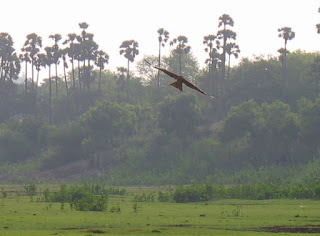Most early mornings this week I have noticed some juvenile Black Kites on the Samudram Eri. Today there were three young ‘uns soaring and gliding in the thermals of the Eri. Below are some photographs from this morning. For more details of the Black Kite, refer to this earlier link.
23 May 2012
22 May 2012
Pied Crested Cuckoo
On my walk yesterday morning on the Samudram Eri, saw this very nice Pied Crested Cuckoo (Jacobin Cuckoo, Clamator jacobinus) sitting on a thorny bush. Although this bird is reputed to be shy, saw no evidence of shyness with this particular bird. It sat confident and disinterested whilst I and my dogs walked by its perch. The Cuckoo remained happily perched on the same thorny bush, staring into space, after we walked by.
This bird is about the size of a Mynah, but with a longer tail. Its a handsome, crested black-and-white Cuckoo. This medium sized, slim black-and-white Cuckoo with crest is distinctive. The white wing patch on the black wing and the pattern make it unmistakable even in flight. This bird is found singly or as part of a pair. The habitat of this species is mainly in thorny, dry scrub or open woodland whilst avoiding areas of dense forest or extremely dry environments. This bird is commonly found in the neighbourhood of habitations.
Its nesting season is chiefly from June to August, but as this bird is parasitic its nesting coincides with the breeding cycle of its nest hosts, which is often the babbler. Eggs are laid hurriedly in the morning into the nest of the host often dropped while the bird perches on the rim of the nest and often resulting in the cracking of one or more host eggs. The Cuckoos eggs are blue, similar to the Babblers. Other hosts include the Red-vented Bulbul, and the eggs laid then are mostly white to coincide with those of the host.
Legend has it that this bird never drinks water off the ground. And that however thirsty it may be it supposedly drinks only rain water as it falls from the heavens. It is said to live many days without water and when it is really thirsty, it calls upon the clouds to shower rain. And so it has come to symbolise a true spiritual aspirant.
“Can
drops of wisdom from the clouds of eternity,
Be
available just like that, until one has the nature of the Chatak?”
(Lalan Fakir)
The Pied Crested Cuckoo
The
great Sanskrit poet, Kalidasa, refers to this bird in his epochal work,
“Meghadootam” (i.e. 'the messenger of the clouds') as a metaphor for deep
yearning. And this tradition continues in literary works in Hindi.
Sri
Sathya Sai Baba refers to the Chataka bird in His discourse during Shivarathri 1991:
“The
Chataka bird endures many ordeals to secure unsullied raindrops from the
clouds. The moment it espies a dark cloud in the sky, it embarks on its
adventure. There is water aplenty on the earth in lakes, ponds and rivers, but
the Chataka bird has no use for these polluted waters. It waits for the pure
raindrops in the month of Karthika and does not seek any other water. It is
undaunted by thunder and lightning. It seeks only the pure raindrops falling
from the clouds, without fear or concern. It sings in joy as it drinks the
raindrops.
The
Chataka bird is an example of pure love. The true devotee should perform a
similar penance (to realise God). He must have the same determination. He must
go through similar ordeals to experience the ultimate ecstasy. He must not
succumb to the wiles and attractions of the world. The golden life of man
should be tested on the touchstone of the Lord's name.”
Subscribe to:
Comments (Atom)












